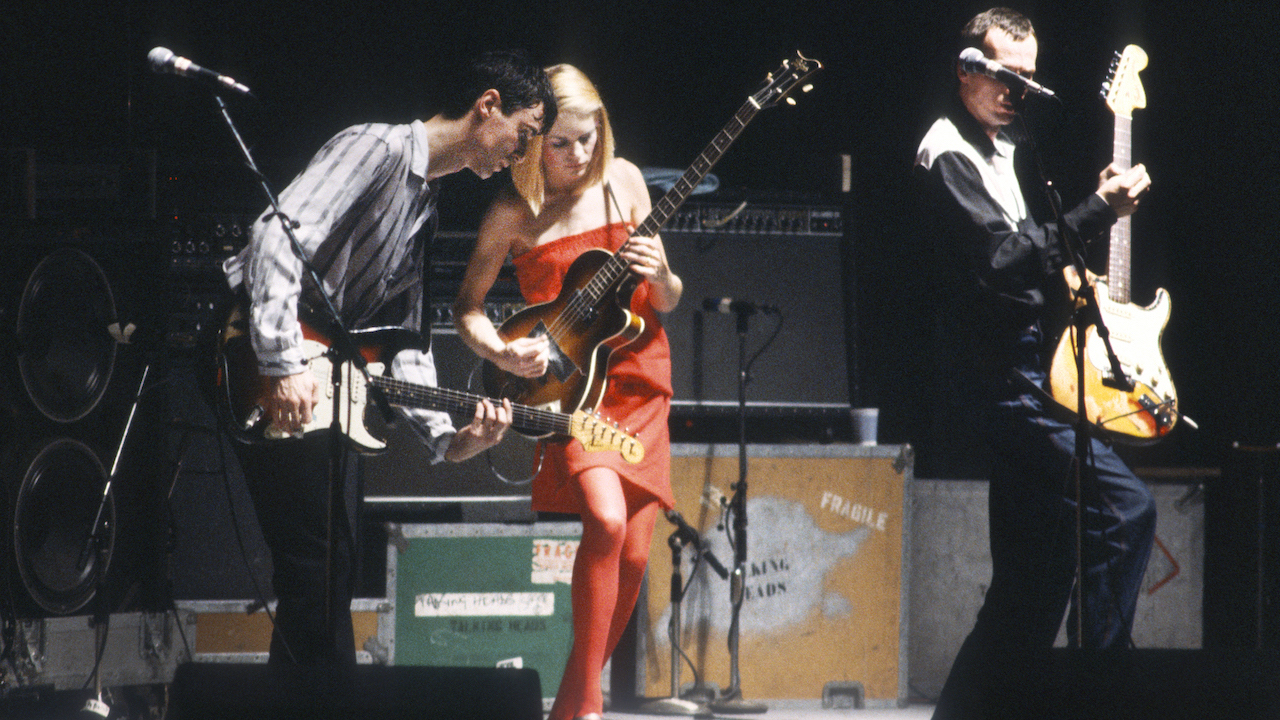“I understand the Phil Spector wall-of-sound thing, but there comes a point where less is more”: How Tina Weymouth came up with her unforgettable bass riff on Talking Heads’ Once In A Lifetime
With a career heading back as far as the 70s, Tina Weymouth never strayed far from the cutting edge of cool – just don't ask her about Jaco Pastorius

Talking Heads – comprising frontman David Byrne, drummer Chris Frantz, guitarist Jerry Harrison and bassist Tina Weymouth – made their first public appearance together in over 20 years at the 2023 Toronto International Film Festival. Despite prior speculation, they did not perform or mention their tumultuous break-up. As Weymouth once told BP: “We don’t even think about that anymore, except when journalists bring it up. There was no falling out. I don’t think we ever had a fight, but I don’t think it’ll ever happen.”
If you’re familiar with the atmospheric 1981 single Once In A Lifetime, you may be aware of the story that accompanies it of producer Brian Eno asking each band-member to start a new bar in a different place, in order to create a weird shifting feel. As a result, Tina’s unforgettable bass riff is the song’s anchor. “We had this big jam. That’s how it came about. I credit Chris for this, because his rhythm is so rock-solid and steady. He hits really hard on the kick and snare, and he puts all this swing in his hi-hat. That’s where all the nuance comes from, and that makes it incredibly groovy. It was always fantastic to play with him.”
The amazing spaces in Talking Heads’ music allowed Weymouth to move around with her bass parts. “We really worked to create that. Our heroes in that respect were the JBs, but also before that the Stax people like Steve Cropper, and Booker T & The MGs - people who had an incredible ear to allow everything to resonate. The sparser the music is, the bigger it sounds. I understand the Phil Spector wall-of-sound thing, but there comes a point where less is more. As you layer and layer and layer, things begin to cancel each other out.”
How about Road To Nowhere, whose staccato syncopated bassline ruled the airwaves for pretty much the whole of 1985? “I started that line with Chris on drums, and then the others played along with it. The beauty of having all that space and all that air is that it gives the listener, almost the ability to participate. That’s one of the things that I like when I’m listening to music: the ability to add my own parts in my head. Harmonies, counterpoints and so on: it’s part of what makes music so sociable.”
The less-is-more approach also applied to Weymouth’s bass gear. “I used a Hofner Contemporary bass. It’s cherry red, no pickguard. I do love the Hofner’s. That classic Les Paul shape really balances well and is very lightweight. They’re quite sturdy: I’m not somebody who does funky pops or anything like that, so I’d never have to beat my basses up.”
Asked if her approach to bass has evolved over the years, Weymouth explained: “It’s easy to be flashy when you’ve been playing 40 years or more, but I never wanted to be. It’s like louder doesn’t make you better: being busier doesn’t make the bass guitar more noticeable. It’s about whatever works for the song: that’s what you want to go for. It’s pretty straightforward!”
Talking Heads were known for their experimental approach to pop music, with a melting pot of influences leading to their success. Was jazz fusion ever among those influences, we wonder? “I had a really good friend called Alex Sadden, an engineer for Grace Jones, who used to room with Jaco Pastorius. They lived in Florida and Alex told me that Jaco would get up in the morning, just wearing shorts because it was so hot, and he’d have his guitar on while he was making coffee or scrambling eggs! He’d practice and practice, constantly. But I didn’t know Jaco. By the time I got to New York he was really wasted, and his thing was to jump on stage uninvited and walk all over everybody. That’s not the Jaco I would like to remember, but I’m not into Jazz Fusion anyway – I hate it. I find it repulsive as a musical genre. I just I don’t think it’s interesting when things are in 7/4 time. Sometimes it’s a car wreck.”
Get The Pick Newsletter
All the latest guitar news, interviews, lessons, reviews, deals and more, direct to your inbox!

The band's Toronto festival appearance marked the debut of a new restoration of the 1984 concert film, Stop Making Sense, which is screening now. Its album companion also got a deluxe-edition reissue and is available to buy.
Joel McIver was the Editor of Bass Player magazine from 2018 to 2022, having spent six years before that editing Bass Guitar magazine. A journalist with 25 years' experience in the music field, he's also the author of 35 books, a couple of bestsellers among them. He regularly appears on podcasts, radio and TV.
“When I first heard his voice in my headphones, there was that moment of, ‘My God! I’m recording with David Bowie!’” Bassist Tim Lefebvre on the making of David Bowie's Lazarus
“One of the guys said, ‘Joni, there’s this weird bass player in Florida, you’d probably like him’”: How Joni Mitchell formed an unlikely partnership with Jaco Pastorius










